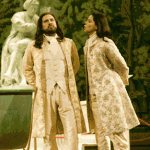 A few thoughts carried over from a weekend of getting up to various things:
A few thoughts carried over from a weekend of getting up to various things:
1. Carrying the Keys: A few months ago, I spent a tense hour or two watching three burly guys transport a piano belonging to a dear friend of mine up several flights of stairs to his apartment. It looked like back-breaking work. So I was amazed to come across this wonderful short documentary film about Edward Gong, a 75-year-old Bay Area piano mover who had transported around 7,000 pianos singlehandedly during his long career. Turns out that Gong, who sounds like an eccentric character, passed away last weekend. The San Francisco Chronicle posted an affectionate obit about him.
2. Arcadia or Al Quaeda?: At almost four hours in length with nearly every aria an expression of the same topic (love — how it lifts the soul, how it tears it apart, how one ensnares a lover, how one ditches him etc etc) Handel’s Xerxes tale of romantic intrigue, though musically vibrant, can become wearing after a while. However, for a variety of reasons, my interest never waned on Friday night when I caught a performance of Nicholas Hytner’s production of Handel’s Xerxes at the San Francisco Opera. David Fielding’s sets and costumes are so packed with visual metaphors, some of which make more sense than others, that the denseness of the imagery threatens to bog down the thrust of the story. Why the astroturf curtain, for example? Still, I love the contrast between the pristine interiors in which the natural world is “captured” and put on display in a set of cases and cordoned off areas as in a museum, and the rocky, barren desert landscape beyond Xerxes’ palace walls. Providing a backdrop for the King’s political maneuverings, the contrast made me think of recent misguided Western attempts to tame hostile foreign shores. “Arcadia or Al Queda?” I thought as I watched what was happening on stage. Also, thanks to some of the best acting I’ve seen on San Francisco Opera’s stage in recent seasons from a cast that included a swaggering Susan Graham in the title role, David Daniels as Xerxes’ long-suffering underdog brother Arsamenes and Lisette Oropesa as the object of both of their affections, Romilda, the time flew by.
3. D-School Drivel: Stanford’s trendy Institute of Design (known as the D-School on campus) has become such a core focus of university life that its methodology (“design thinking”) has been adopted by departments all across campus. Hundreds of graduate students turned up for the D-School’s open evening on Thursday night. But when each visitor was handed a Kleenex by a smiling D-School acolyte soon after entering the building, I knew I was in for trouble. The focus of the event was for professors to pitch their upcoming winter and fall courses. There are some exciting-sounding programs on offer. I’m fascinated in particular by courses on the designing of social brands and storytelling / visual communication. But what continues to be a barrier to entry as far as I am concerned is the inane way in which the D-School people present themselves to their public. A professor asked us all to bark like dogs at one point. Another made us clap together in time. When the Kleenex woman told us we had 15 seconds to design a gift using the prop and then present it to the person standing next to us, I decided enough was enough. I like to play around as much as the next person. (I danced so madly with two little girls at a wedding this past weekend that I left a trail of blood on the carpet of the cruise ship upon which the wedding party was sailing around the Bay. I should never have attempted that break-dancing move which involved landing on my knees one too many times.) But the D-School type of play isn’t usually very satisfying. It appeals to the lowest common denominator of people’s imaginations and often seems superimposed on the ideas they’re trying to put across rather than truly germane.
